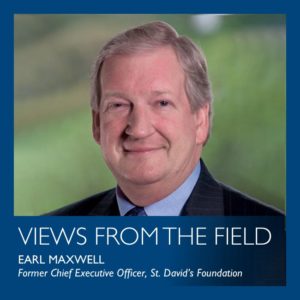

Earl Maxwell, Former Chief Executive Officer, St. David’s Foundation
It seems like an eternity since I received news in March from Grantmakers In Health that I had been honored with the 2020 Terrance Keenan Award. So much in the world has changed since then.
The recognition is particularly significant because the St. David’s Foundation is a place-based funder that focuses its work in a five-county area known as Austin, or Central Texas. Because of our regional focus, it is unusual for our foundation or its leadership to receive national recognition. On behalf of St. David’s Foundation, its Board and staff, thank you so much for this honor.
When I retired as CEO of the St. David’s Foundation at the end of 2019, I could have never imagined the changes that have swept the world as a result of COVID-19. My personal plans for 2020 were to move to Port Aransas, a fishing village twenty miles north of Corpus Christi; travel internationally; write a couple of books; and build an eighteen-foot wooden boat. Like the rest of the world, my wife Anita and I never imagined sheltering in place. Anita knew we would be spending more time together; however, she had no idea it would be this confining. Since quarantining, I have managed to do some fishing, the door hinges in our home have been oiled, and the yard has never looked better.
Recently, I visited with my successor at St. David’s Foundation, Dr. Edward Burger, and we discussed the impact of the pandemic. I suggested that my 20 years of experience at St. David’s Foundation no better prepared me to lead the foundation through the complexities of COVID-19 than did his years of experience in academia and as President of Southwestern University. In his new role leading a philanthropic organization, he has been handed a playbook that changes daily, if not hourly. The best one can do is make decisions based on the latest and most accurate information available.
We agreed that COVID-19 represents the biggest change in the world—and for philanthropy—since 9/11. For our parents’ generation, this challenge was World War II. These three events were largely unexpected, caught us by surprise, and forever changed the world. In this new world, grantmakers have been forced to rethink their strategies. Who would have imagined something that would turn the world’s health care systems upside down? Who would have imagined the simultaneous shut down of the global economy?
Terrance Keenan believed that people and ideas are the heart of philanthropic leadership. He observed that grantmakers need “an astute sense of what is significant—not only the quality of the ideas underlying the proposal but the quality of the people behind the ideas.” In his view, effective grantmakers “proactively and constantly seek out the best ideas, people, and institutional systems to advance a foundation’s goals.” Terrance Keenan’s beliefs and observations have never been more relevant than today.
Philanthropy must discern what is most significant about this crisis. Who are the people behind the ideas and the models? How does philanthropy respond to the next pandemic, which may be entirely different than COVID-19? What worked well? What did not work so well? How do we lessen our nation’s dependence on the rest of the world to supply pharmaceuticals and personal protective equipment? Most importantly, how can philanthropy rise above the politics of a pandemic? And how does philanthropy balance its funding model between traditional and emergency funding? Philanthropy must assess also lessons from sheltering in place. What aspects of distance learning can be incorporated into the delivery of post-pandemic education? What aspects of working from home can be incorporated into our work cultures? A fresh look at these questions could significantly change our approach.
The Grantmakers In Health network is well positioned to assess the response to COVID-19, and develop a roadmap for the future. I have intentionally raised more questions than answers. I believe Terrance Keenan would be energized by the leadership opportunities created for funders by today’s circumstances, and I trust that philanthropy will embrace the challenges ahead.
